Finally some peace and damn quiet. Rome is as turbulent on the home front as it is at war it seems. Hopefully no major enemies come to take advantage of this at a later date.
The Punic Curse
- Thread starter loki100
- Start date
-
We have updated our Community Code of Conduct. Please read through the new rules for the forum that are an integral part of Paradox Interactive’s User Agreement.
You are using an out of date browser. It may not display this or other websites correctly.
You should upgrade or use an alternative browser.
You should upgrade or use an alternative browser.
Ouch! A civil war with that large nation is guaranteed to hurt. And to hurt badly...
That was very good update to show how the senate lives and changes, how the amount of senators change and how it affects who becomes a ruler after things happen one way or another. There were very different rulers during that decade and it will be interesting to see who will join the rebels and who will remain loyal to the original government.
I've split the game play underlying the AAR into 'books' and have just finished the sequence that will form book 2. In part as there were less thematic events and that the period post civil war was more domestic, I may write up most of it on the basis of Consular reigns.
The Civil War is more a pain than a threat. Lots of lost income and more lost manpower (which I really cannot afford)
Very informative post. Have been playing Suebi in basic rome.
Think I need to read the manuel.:huh:
I'd also get VV to be honest, I've never played the basic game but it seems to really improve on the options and gameplay
Civil War, woof. Hopefully you can keep the other factions in line, the Mercantile faction would be a bad one to lose.
Aye, at the moment any option that reinforces either the mercantile or religious factions I am taking, if either of them decide to push for power I have a huge problem
I usually prefer the Civics or the Mercantile faction, except when I need the Military one. You made an interesting post out of a peaceful time. Now on to civil war!
Agree, usually I find the Religious faction not that much use, but here I was really picking anything that weakened the Populists and worried about the consequences later on. In the end I had a real problem with a Mercantile domination of the Senate but thats for much later.
Finally some peace and damn quiet. Rome is as turbulent on the home front as it is at war it seems. Hopefully no major enemies come to take advantage of this at a later date.
Ah well the peace and quiet is about to be shattered. You're right, the civil war as such I can cope with, if an external enemy stepped in then I am in real trouble
An Air of Public Panic: The Civil War - November 658-April 659
By late 658, the Republic was on the edge of civil war. The tension between the Populists and the dominant Religious-Mercantile faction had become focussed on the fate of Quintus Lutatius Catulus currently legate of the 1st legion based in Gaul.
Previous crises had been solved by either facing down the potential rebels, offering jobs or, at the extreme, simple bribery. This time, the payment was described as compensation for a villa that had been destroyed in the recent barbarian incursions along the Illyrian frontier.
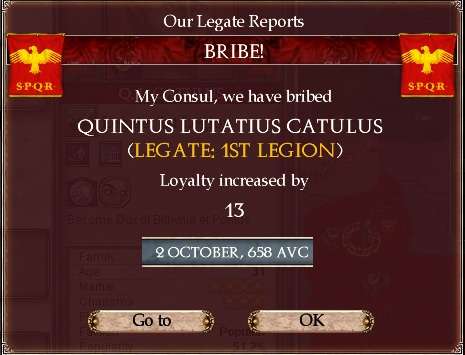
That the bribe was accepted, and seemed to end the crisis perhaps lulled the Senate into a false sense of optimism. In effect they confused the surface dispute with the underlying tensions about the governance of the Republic and the ongoing political control of the Religious-Mercantile faction. Within a month, hoping that his initial support had been reduced, it was decided to arrest Lucius for embezzlement.
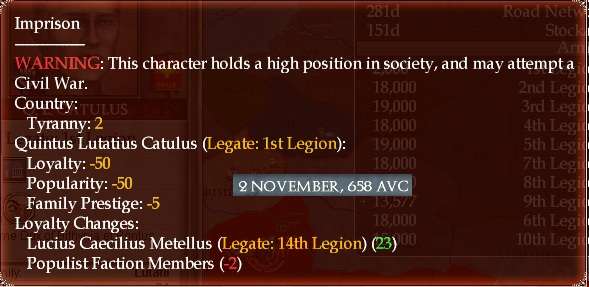
This time he refused to give up his command and for the first time a Roman commander turned his troops on the Senate. However, Catalus had been outmanouvered. The bulk of his legion had been redeployed (ostensibly to put down an outbreak of brigandage in the Pyrenees), leaving him with just 2 cohorts of archers guarding the provincial fort.
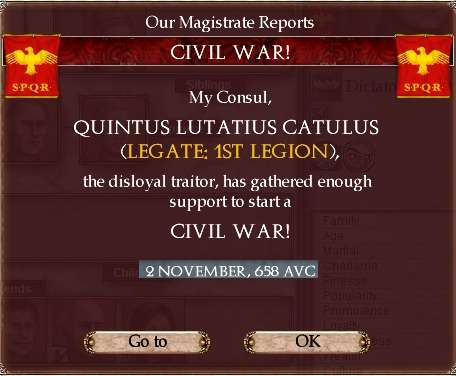
Within two weeks, Lucius Caecillius Metellus brought the loyal portion of his old legion (now renamed the 14th) to bear

However, Catalus escaped the slaughter. Many claimed he fled before battle was even joined, betraying his loyal troops as they faced their old colleagues.
At this stage though it became clear that the excuse of Civil War had been used by many restive governors and provinces to seek local autonomy. In effect, the revolt splintered into 4 regional uprisings centred on south Spain, the newly acquired territories in Gaul and Illyria, the bulk of Greece and Asia Minor where Roman rule had always been resented and in a series of Italian provinces where senior members of the Populist faction held their lands.
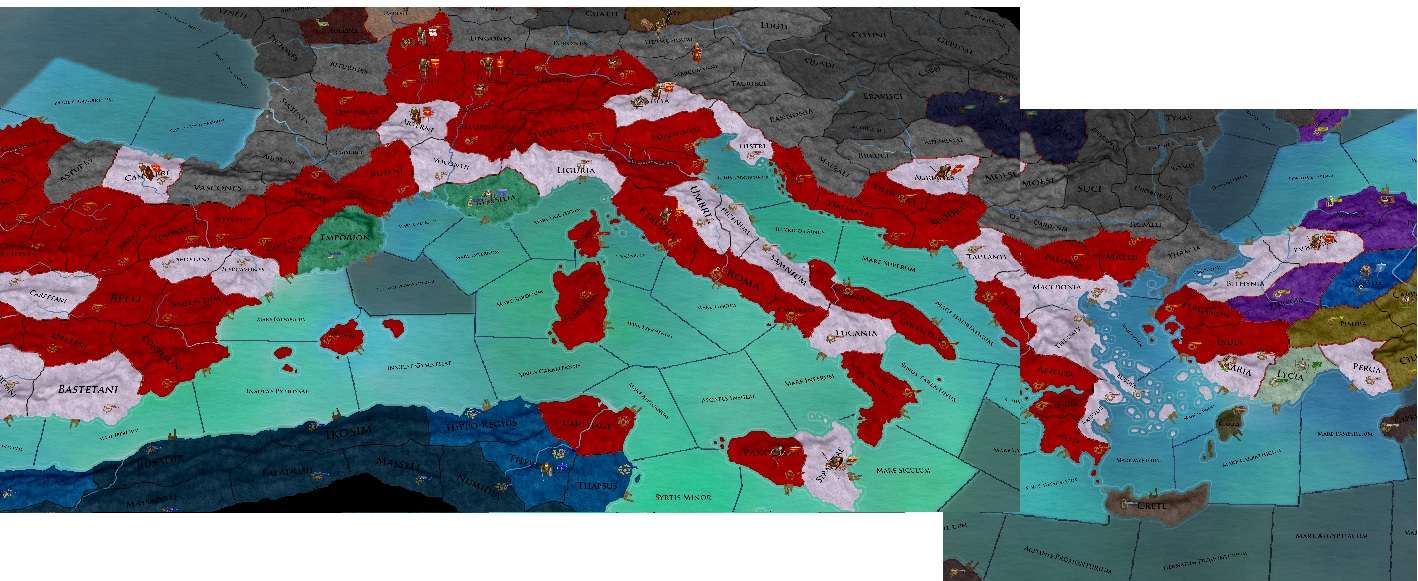
Luckily for the Republic, both the army and the fleet remained loyal. It seemed that as long as the Civil War did not become an excuse for foreign intervention, then the Senate would quickly re-establish control. Some provinces, where the local legions were loyal, were reclaimed in a matter of days
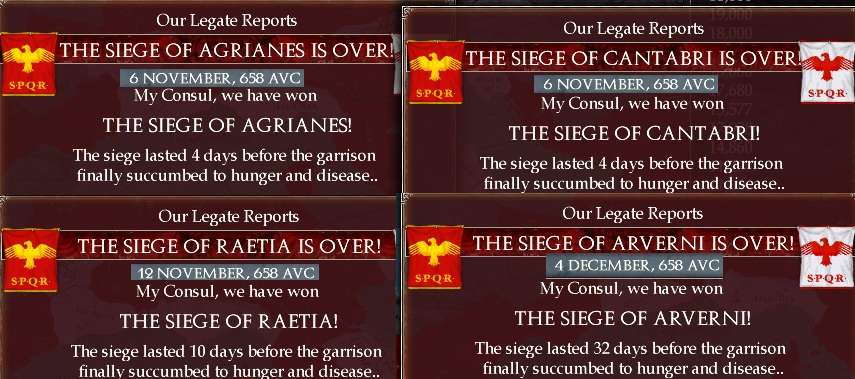
However, the Populist faction had committed too much to this revolt. Even if the army remained loyal, many prominent individuals pledged themselves to the revolt and started to raise troops in the rebel held regions.
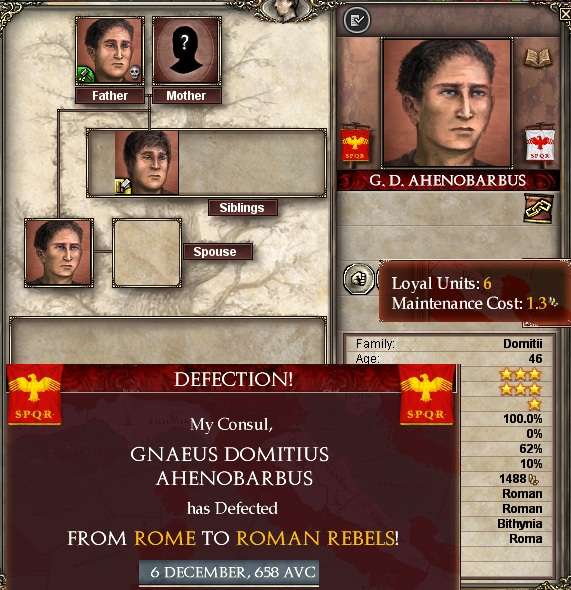
In turn, those loyal to the Republic made fresh units available.
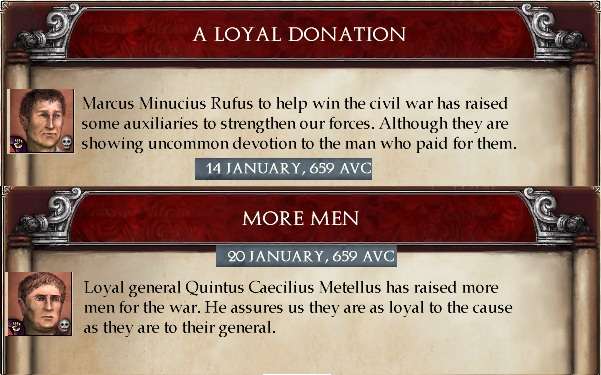
If in one sense, this was welcome as indicated not all the Populist faction supported the rebellion. On the other hand, addition of more and more cohorts owing allegiance to a single man, not the State, was to create fresh problems when the army had to be reduced after the second Numidian War.
Still the war remained a set of fragmented struggles between individual cities and the Republic's legions, and by February 659, Spain was brought back under control
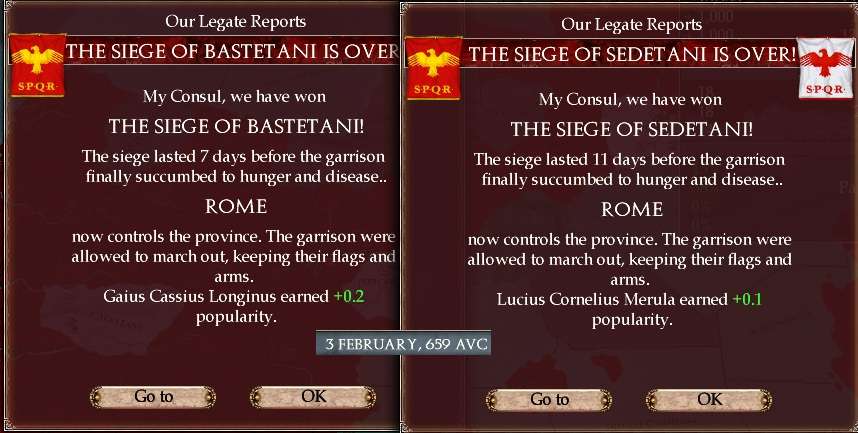
However, any optimism that the threat to the Republic could be minimised was quickly squashed. Murder on the streets of Rome, especially in the teeming Aventine district, was nothing new. With tensions heightened by Civil War, by not knowing who might defect next, by the fear that some Legions would follow their commanders over to Catalus' side, political murder in Rome almost brought public life to a standstill.
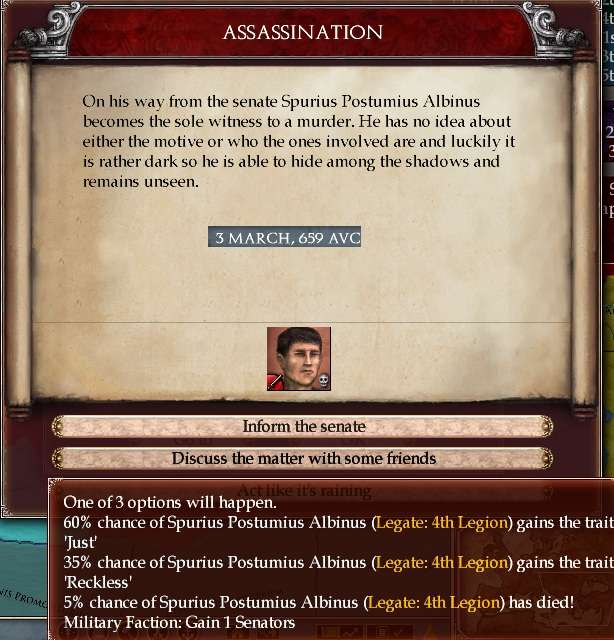
Fear became panic in early March when Rome itself was besieged. All the legions in Italy were bogged down in sieges leaving the city defended by little but the Urban Cohorts, better trained for firefighting than warfare.
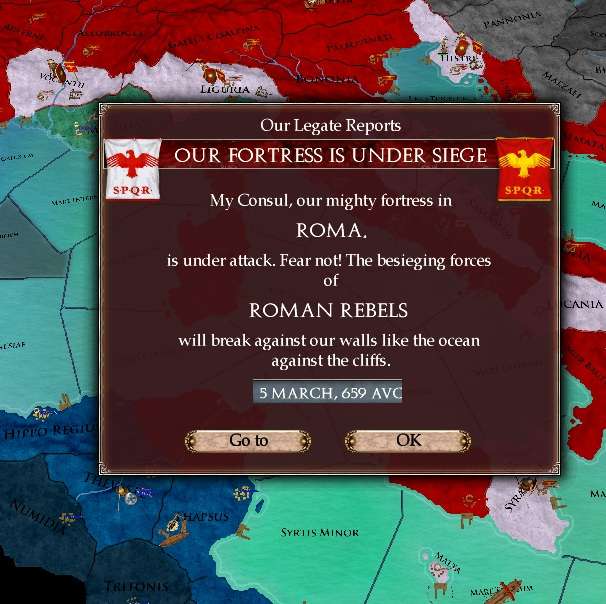
Panic became a belief that all was lost when Metellus was found dead in his tent. In normal times, this would have been accepted as an accident, a consequence of his age, at worst an unexplained death, with the city besieged, with the rebels raising small armies, the lack of wounds only made things worse. Sorcery, black magic, the import of Carthage's dark gods into the heart of Rome were all common and widely accepted explanations.
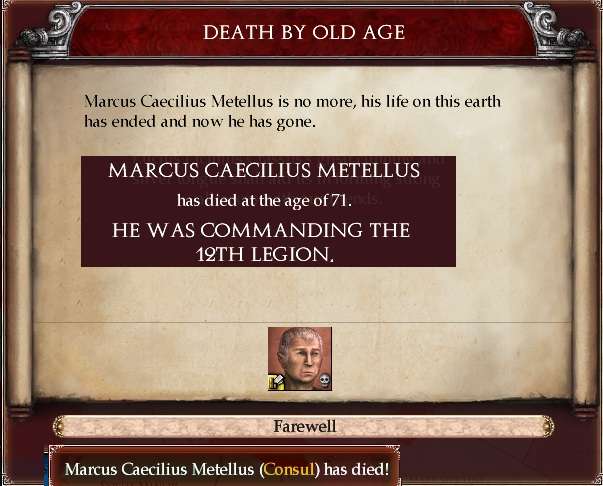
Nor was the mood lifted by stories of another major barbarian incursion into Raetia.
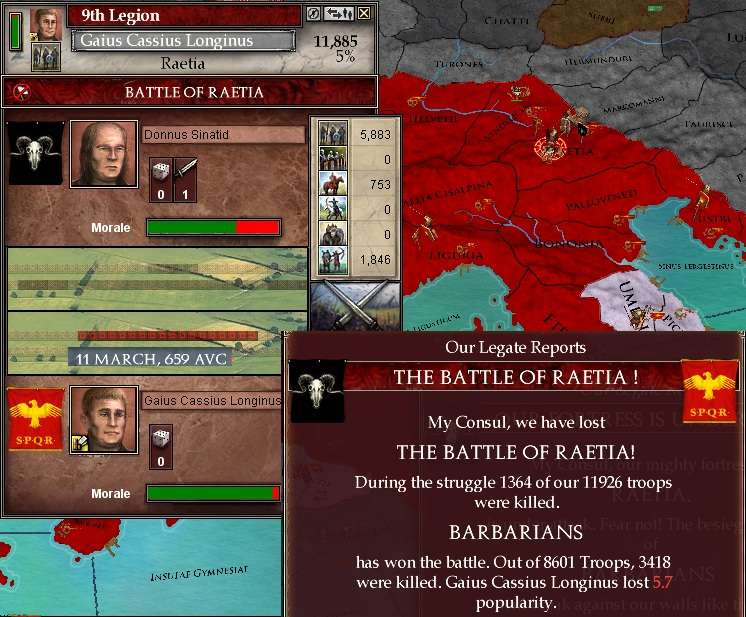
Even though, in reality, the Civil War had already swung decisively in favour of the Senate, public confidence worsened, and the news from the college of Augurs was almost enough to cause mass panic.
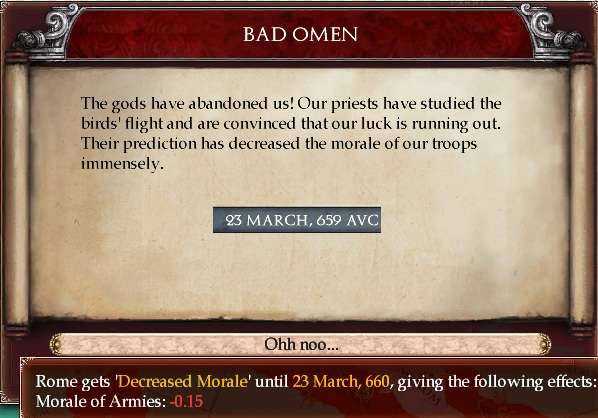
What Catalus and the Populists might fail to win on the battlefield, they might yet achieve by undermining the will of the Senate.
AND, a reminder to please vote in the ACAs. Its an easy way to reward all the various authaars who produce AARs across AARland.
By late 658, the Republic was on the edge of civil war. The tension between the Populists and the dominant Religious-Mercantile faction had become focussed on the fate of Quintus Lutatius Catulus currently legate of the 1st legion based in Gaul.
Previous crises had been solved by either facing down the potential rebels, offering jobs or, at the extreme, simple bribery. This time, the payment was described as compensation for a villa that had been destroyed in the recent barbarian incursions along the Illyrian frontier.

That the bribe was accepted, and seemed to end the crisis perhaps lulled the Senate into a false sense of optimism. In effect they confused the surface dispute with the underlying tensions about the governance of the Republic and the ongoing political control of the Religious-Mercantile faction. Within a month, hoping that his initial support had been reduced, it was decided to arrest Lucius for embezzlement.

This time he refused to give up his command and for the first time a Roman commander turned his troops on the Senate. However, Catalus had been outmanouvered. The bulk of his legion had been redeployed (ostensibly to put down an outbreak of brigandage in the Pyrenees), leaving him with just 2 cohorts of archers guarding the provincial fort.

Within two weeks, Lucius Caecillius Metellus brought the loyal portion of his old legion (now renamed the 14th) to bear

However, Catalus escaped the slaughter. Many claimed he fled before battle was even joined, betraying his loyal troops as they faced their old colleagues.
At this stage though it became clear that the excuse of Civil War had been used by many restive governors and provinces to seek local autonomy. In effect, the revolt splintered into 4 regional uprisings centred on south Spain, the newly acquired territories in Gaul and Illyria, the bulk of Greece and Asia Minor where Roman rule had always been resented and in a series of Italian provinces where senior members of the Populist faction held their lands.

Luckily for the Republic, both the army and the fleet remained loyal. It seemed that as long as the Civil War did not become an excuse for foreign intervention, then the Senate would quickly re-establish control. Some provinces, where the local legions were loyal, were reclaimed in a matter of days

However, the Populist faction had committed too much to this revolt. Even if the army remained loyal, many prominent individuals pledged themselves to the revolt and started to raise troops in the rebel held regions.

In turn, those loyal to the Republic made fresh units available.

If in one sense, this was welcome as indicated not all the Populist faction supported the rebellion. On the other hand, addition of more and more cohorts owing allegiance to a single man, not the State, was to create fresh problems when the army had to be reduced after the second Numidian War.
Still the war remained a set of fragmented struggles between individual cities and the Republic's legions, and by February 659, Spain was brought back under control

However, any optimism that the threat to the Republic could be minimised was quickly squashed. Murder on the streets of Rome, especially in the teeming Aventine district, was nothing new. With tensions heightened by Civil War, by not knowing who might defect next, by the fear that some Legions would follow their commanders over to Catalus' side, political murder in Rome almost brought public life to a standstill.

Fear became panic in early March when Rome itself was besieged. All the legions in Italy were bogged down in sieges leaving the city defended by little but the Urban Cohorts, better trained for firefighting than warfare.

Panic became a belief that all was lost when Metellus was found dead in his tent. In normal times, this would have been accepted as an accident, a consequence of his age, at worst an unexplained death, with the city besieged, with the rebels raising small armies, the lack of wounds only made things worse. Sorcery, black magic, the import of Carthage's dark gods into the heart of Rome were all common and widely accepted explanations.

Nor was the mood lifted by stories of another major barbarian incursion into Raetia.

Even though, in reality, the Civil War had already swung decisively in favour of the Senate, public confidence worsened, and the news from the college of Augurs was almost enough to cause mass panic.

What Catalus and the Populists might fail to win on the battlefield, they might yet achieve by undermining the will of the Senate.
AND, a reminder to please vote in the ACAs. Its an easy way to reward all the various authaars who produce AARs across AARland.
Last edited:
You're in for quite the ride. The events that give the rebels extra armies tend to make sure it gets rather drawn out a lot once you have an empire worth naming 'empire'. I'll be here, enjoying the spectacle!
Ah, civil wars, they keep things interesting even when one is big. Dealing with barbarian invasions at the same time is always fun.
Times are certainly eventful in the Republic. This civil war and the continued barbarian incursions are like a bleeding sore: not fatal, not by a long shot, but certainly sapping a lot of strength. Looking forward to a speedy resolution so that Rome can continue its rightful march to ever expanding greatness. And continued persecution of the Populists, of course - low-life uppity rabble, the lot of them.
You're in for quite the ride. The events that give the rebels extra armies tend to make sure it gets rather drawn out a lot once you have an empire worth naming 'empire'. I'll be here, enjoying the spectacle!
This update ends just at the point where the first of those scripted units appears. Since that coincided with the rebels losing all but a few final cities I've presented it as a change of tactics and may add the allegation that the units were often run away slaves freed by the chaos. In turn that will add a nice bit of malice to the post civil war proceedings.
Ah, civil wars, they keep things interesting even when one is big. Dealing with barbarian invasions at the same time is always fun.
I was mostly very lucky in this war that I had so few barbarian events or normal revolts. It allowed me just to methodically prosecute the sieges (quite a few Italian provinces have a level 3 fort) with not too many distractions.
Time to put the Populares where they belong.
One good thing of all this is they do lose a lot of power in the Senate. They were mostly in the mid-20s before the Civil War and up 12-15 afterwards so much easier to handle (for a while)
Times are certainly eventful in the Republic. This civil war and the continued barbarian incursions are like a bleeding sore: not fatal, not by a long shot, but certainly sapping a lot of strength. Looking forward to a speedy resolution so that Rome can continue its rightful march to ever expanding greatness. And continued persecution of the Populists, of course - low-life uppity rabble, the lot of them.
Aye, its not a direct threat to the Republic, but as I find out later, my end game rivals if I want the Eastern Med are growing stronger while I'm losing manpower and reclaiming my own lands.
Very interesting AAR, loki. Subscribed.
glad you're enjoying it ..
Turning the Tide, Catalus' revolt: April 659-July 660
Even as Rome was gripped by panic, the Senatorial armies in the field gradually re-asserted control. More rebel leaders were captured, often betrayed by their own men.
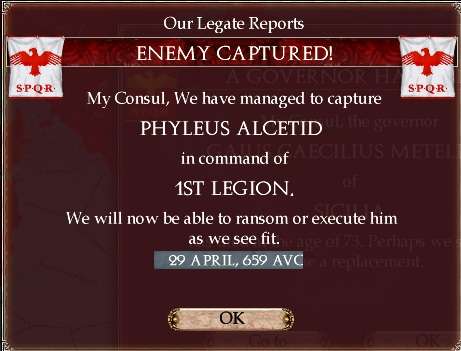
Spirits rose even more in early May when the siege of Rome was lifted
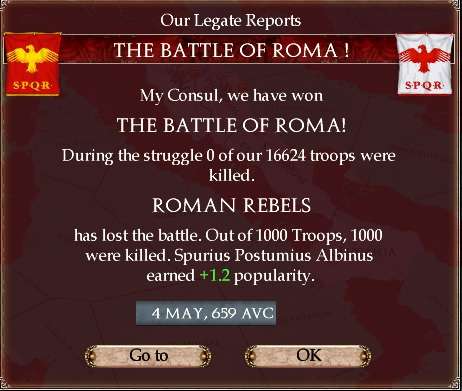
However, even as the war was tilting decisively to the Senate, the Rebels gained a huge boost to their morale. Under pressure from others in his Populist faction, Gaius Marius finally joined Catalus' revolt. However, despite his fame, he failed to convince any ships of the 2nd Navy (operating off Sicily) to join him.
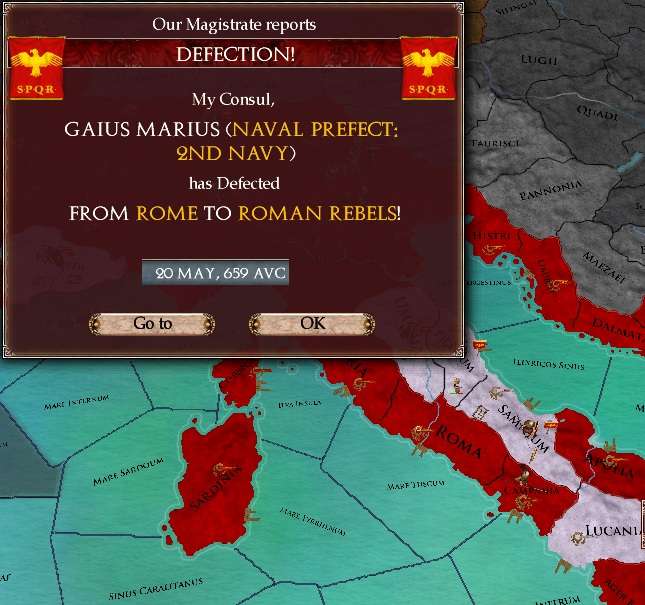
In a way typical of the shifting fortunes of the period, this bad news was quickly followed by reports that the 9th Legion had destroyed the barbarian infiltration into Raetia.

As the Senatorial armies closed in on the last rebel strongholds, the old rivalries and arguments returned. Even in the midst of civil war too many placed personal ambition ahead of the needs of the Republic.
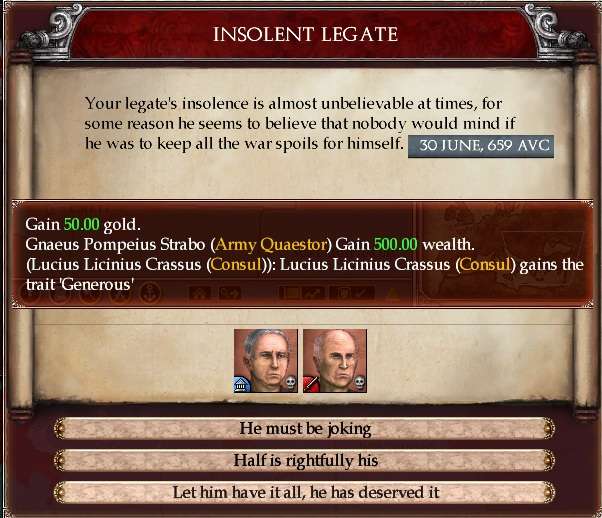
As Consul, many hoped that Lucius Crassus would have acted individually in a different way. It was one thing to turn a blind eye to the actions of subordinates in the chaos and confusion of civil war. To, somewhat prematurely, call yourself "the Conqueror", with no Senatorial approval was too much for many.

The result of Crassus' display of arrogance was to drive more prominent men into the rebellion
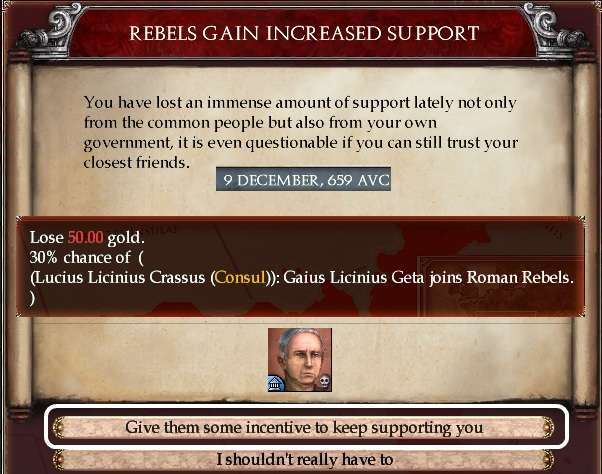
Despite these small set backs, by early 660 all of Spain, most of Italy and north Greece was back in Senatorial hands. In so far as military campaigns carried on, these were confined to the Peleponese and Asia Minor.
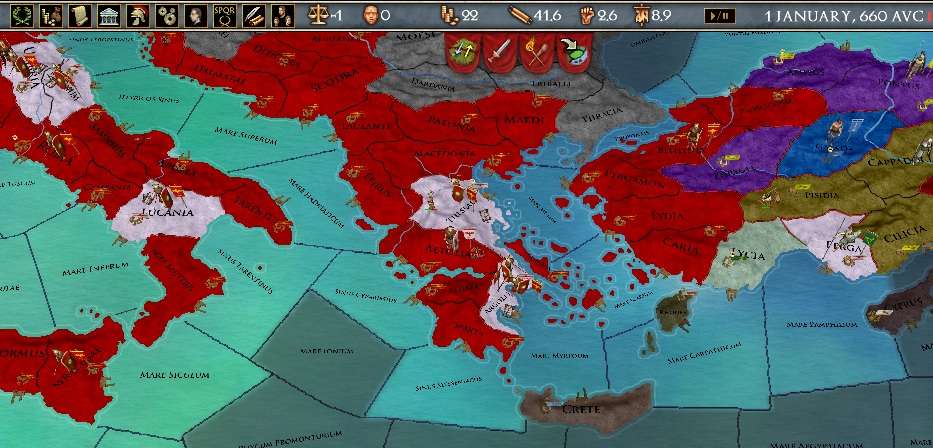
Early 660 brought fresh hope that the war would end soon, leading to growing optimism
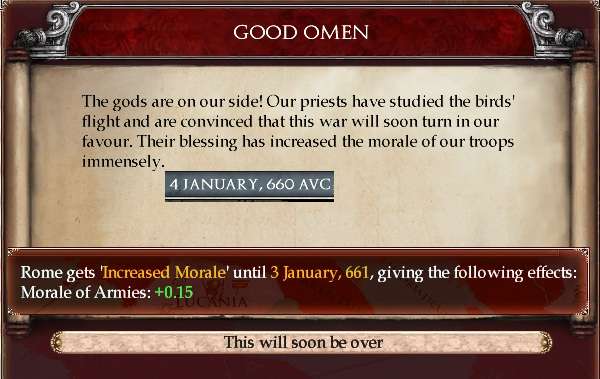
However, Crassus was not the only Senatorial commander to ignore the demands of his office. Lucius Cato, who had taken over the Second Fleet when Marius defected, chose to turn a blind eye to the murder of prominent Populist supporter in Rome. That this had happened near his villa did little to improve his reputation.
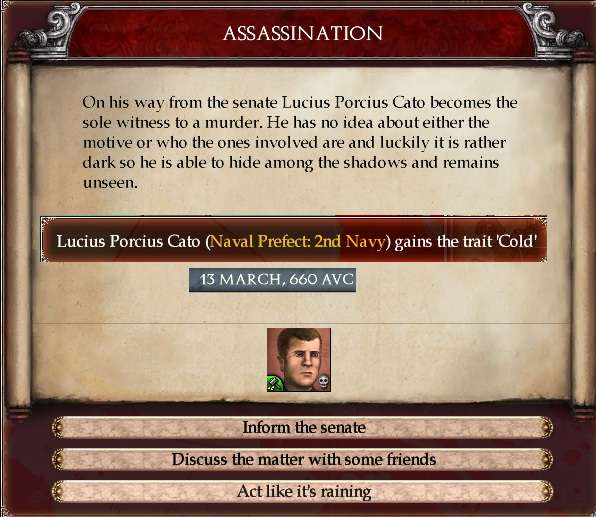
Despite the ongoing political consequences, in the field the Senatorial legions gradually reduced the remaining rebel strongholds. By mid-April 660, the last rebel held town in Italy had fallen.
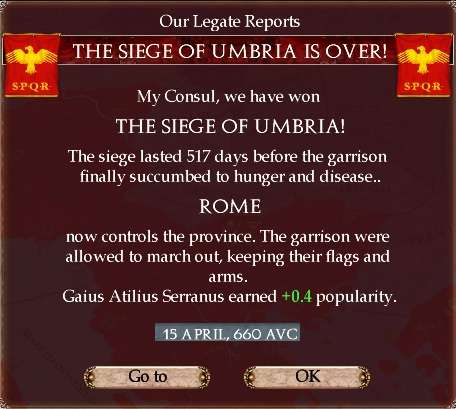
With renewed confidence the war was on the verge of ending, the Senate started to disband some of the fresh forces raised by over-enthusiastic supporters. Not only was the army too large already, the last thing that was needed was more legions loyal to a single man rather than the state. [1]
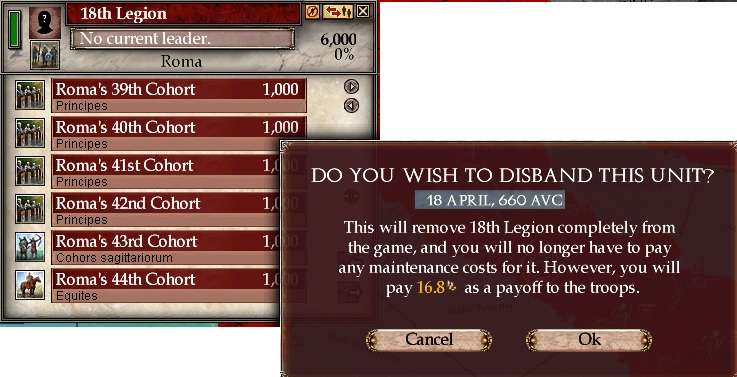
In the east, the barbarian tribes in Thracia finally rebelled. One consequence of the Civil War had been constant movement across their lands. Some commanders had been careful to avoid causing too much damage but Quintus Maximus had allowed his forces too much freedom to enrich themselves as they moved from village to village.
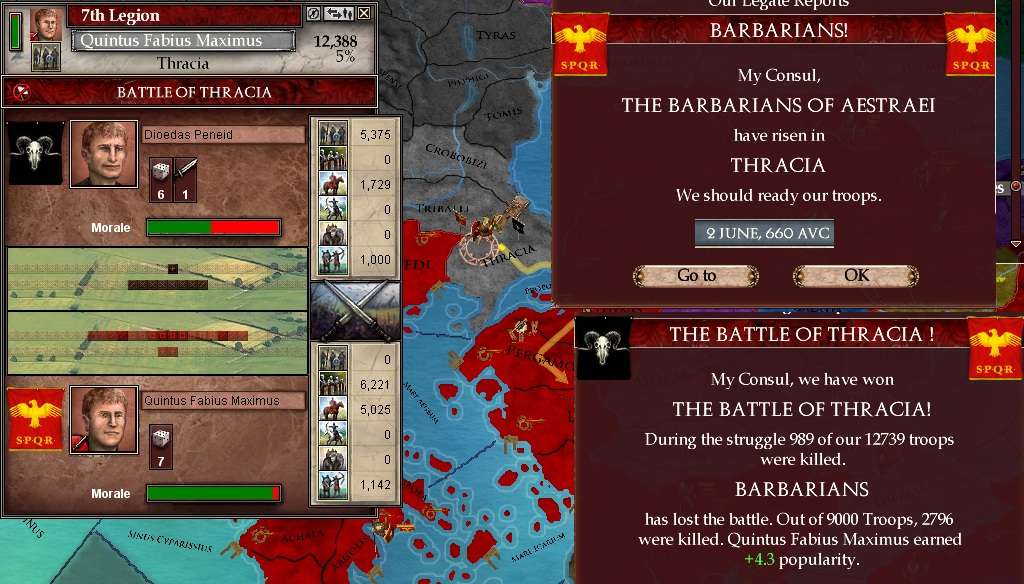
Thus by mid-660 it appeared as if the rebellion had been crushed. In reality Catalus and his conspirators had shifted tactics. The first phase had seen essentially a civic revolt of cities and provinces seeking independence. In the second phase they would seek to challenge the Senate on the field of battle. [2]
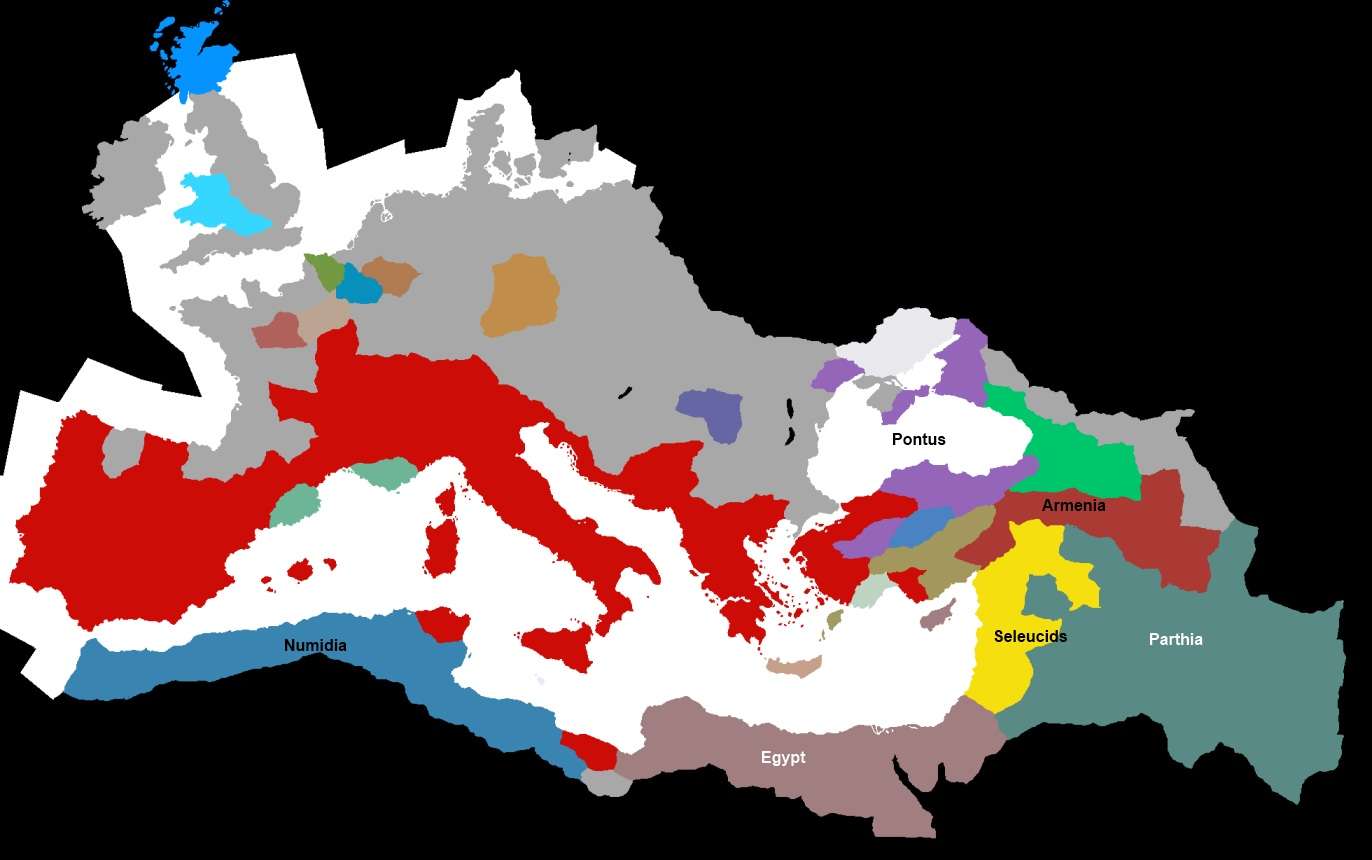
[3]
[1] – up to now, I've taken these quite happily as with my manpower at 0 its a means to increase the size of the army.
[2] – I believe this is as designed. If a civil war lasts long enough, the rebels gain fresh legions by event.
[3] – seems a good time for a wider world view. The Seleucids soon after this start to make some gains. I'm about 15 game years ahead and have encountered their army (in a war where we were on the same side but not allied) and it is huge. My hope is that it is rubbish.
And of course, as ever, a request to go and vote in the ACAs. Its a wonderful excuse to read around and offer support to authaars across aarland.
Even as Rome was gripped by panic, the Senatorial armies in the field gradually re-asserted control. More rebel leaders were captured, often betrayed by their own men.

Spirits rose even more in early May when the siege of Rome was lifted

However, even as the war was tilting decisively to the Senate, the Rebels gained a huge boost to their morale. Under pressure from others in his Populist faction, Gaius Marius finally joined Catalus' revolt. However, despite his fame, he failed to convince any ships of the 2nd Navy (operating off Sicily) to join him.

In a way typical of the shifting fortunes of the period, this bad news was quickly followed by reports that the 9th Legion had destroyed the barbarian infiltration into Raetia.

As the Senatorial armies closed in on the last rebel strongholds, the old rivalries and arguments returned. Even in the midst of civil war too many placed personal ambition ahead of the needs of the Republic.

As Consul, many hoped that Lucius Crassus would have acted individually in a different way. It was one thing to turn a blind eye to the actions of subordinates in the chaos and confusion of civil war. To, somewhat prematurely, call yourself "the Conqueror", with no Senatorial approval was too much for many.

The result of Crassus' display of arrogance was to drive more prominent men into the rebellion

Despite these small set backs, by early 660 all of Spain, most of Italy and north Greece was back in Senatorial hands. In so far as military campaigns carried on, these were confined to the Peleponese and Asia Minor.

Early 660 brought fresh hope that the war would end soon, leading to growing optimism

However, Crassus was not the only Senatorial commander to ignore the demands of his office. Lucius Cato, who had taken over the Second Fleet when Marius defected, chose to turn a blind eye to the murder of prominent Populist supporter in Rome. That this had happened near his villa did little to improve his reputation.

Despite the ongoing political consequences, in the field the Senatorial legions gradually reduced the remaining rebel strongholds. By mid-April 660, the last rebel held town in Italy had fallen.

With renewed confidence the war was on the verge of ending, the Senate started to disband some of the fresh forces raised by over-enthusiastic supporters. Not only was the army too large already, the last thing that was needed was more legions loyal to a single man rather than the state. [1]

In the east, the barbarian tribes in Thracia finally rebelled. One consequence of the Civil War had been constant movement across their lands. Some commanders had been careful to avoid causing too much damage but Quintus Maximus had allowed his forces too much freedom to enrich themselves as they moved from village to village.

Thus by mid-660 it appeared as if the rebellion had been crushed. In reality Catalus and his conspirators had shifted tactics. The first phase had seen essentially a civic revolt of cities and provinces seeking independence. In the second phase they would seek to challenge the Senate on the field of battle. [2]

[3]
[1] – up to now, I've taken these quite happily as with my manpower at 0 its a means to increase the size of the army.
[2] – I believe this is as designed. If a civil war lasts long enough, the rebels gain fresh legions by event.
[3] – seems a good time for a wider world view. The Seleucids soon after this start to make some gains. I'm about 15 game years ahead and have encountered their army (in a war where we were on the same side but not allied) and it is huge. My hope is that it is rubbish.
And of course, as ever, a request to go and vote in the ACAs. Its a wonderful excuse to read around and offer support to authaars across aarland.
Good grief, the Seleucids have a massive army? Then, judging by that map, Parthia and Egypt must be absolutely terrifying...
I wonder how many troops the rebels get assigned by the game. I know there are dangers going off only a simple political map, but right now you seem to have reasserted your dominance - all provinces under your control, all tax revenue flowing to you: it's hard to see how even an infusion of fresh rebel legions is going to give them much of a chance. Unless, of course, your manpower is still so low that you can't afford any losses (while your opponents get free replacements). Anyway, looking forward to stage two of the civil war.
I wonder how many troops the rebels get assigned by the game. I know there are dangers going off only a simple political map, but right now you seem to have reasserted your dominance - all provinces under your control, all tax revenue flowing to you: it's hard to see how even an infusion of fresh rebel legions is going to give them much of a chance. Unless, of course, your manpower is still so low that you can't afford any losses (while your opponents get free replacements). Anyway, looking forward to stage two of the civil war.
Interesting.. Seleucids fighting back against the Nomads with success.. The western provinces of course more valuable and more useful but still Parthia should be quite a blob to beat... That civil war was solved very nicely before it managed to spread any further, it's a pain in the butt to fight against white dots when they're everywhere 
Also congrats, I just noticed that despite starting your AAR a month later than I started my own you've overtaken me in both views and replies But a bloody good story you have here so that is not a miracle, and anyways this isn't a competition
But a bloody good story you have here so that is not a miracle, and anyways this isn't a competition 
Also congrats, I just noticed that despite starting your AAR a month later than I started my own you've overtaken me in both views and replies
Good grief, the Seleucids have a massive army? Then, judging by that map, Parthia and Egypt must be absolutely terrifying...
I wonder how many troops the rebels get assigned by the game. I know there are dangers going off only a simple political map, but right now you seem to have reasserted your dominance - all provinces under your control, all tax revenue flowing to you: it's hard to see how even an infusion of fresh rebel legions is going to give them much of a chance. Unless, of course, your manpower is still so low that you can't afford any losses (while your opponents get free replacements). Anyway, looking forward to stage two of the civil war.
Lets put it this way. I played the first 25 years of this game on the assumption that the Eastern Med was mine for the taking when I could be bothered. I'm worrying about being able to do so, especially as the Civil War and another North African campaign has left my manpower totally depleted.
I think the armies they get in the next post (I've ignored a few which were just 6 units of militia so no threat at all) are all scripted. The good thing is of course there is no way can they reinforce them, but I'm at the stage where each victory is another 1-2 months of manpower I need to make up somehow. One short term advantage is I can scrap (if I am quick enough) a lot of these 'free' units I gain too (& I believe that manpower then goes back into my pool).
Interesting.. Seleucids fighting back against the Nomads with success.. The western provinces of course more valuable and more useful but still Parthia should be quite a blob to beat... That civil war was solved very nicely before it managed to spread any further, it's a pain in the butt to fight against white dots when they're everywhere
Also congrats, I just noticed that despite starting your AAR a month later than I started my own you've overtaken me in both views and repliesBut a bloody good story you have here so that is not a miracle, and anyways this isn't a competition

The recovery of the Seleucids was a real surprise, so yes I guess it must be that they are both cash and manpower rich in their rump state. Also I guess on 'hard' the chances of an AI civil war are reduced. Egypt is another with a huge army - just I'm not sure how good it is.
The final stages: 660-662
By the summer of 660, not only did it appear as the Civil War was over but the legions won a stunning victory on the lower Danube, securing the new colonies in Thrace

However, even as the 7th Legion moved back into Asia Minor, it became clear the revolt had taken a new form. The leadership of the rebellion had adopted a new tactic. Having lost most of their territory they commenced an attempt to challenge the Senate on the battlefield. A series of hastily raised armies comprised of provincial forces, deserters, those seeking future gains and, worst of all in the eyes of the Senate, freed slaves, sought to take the advantage back from the Senate.
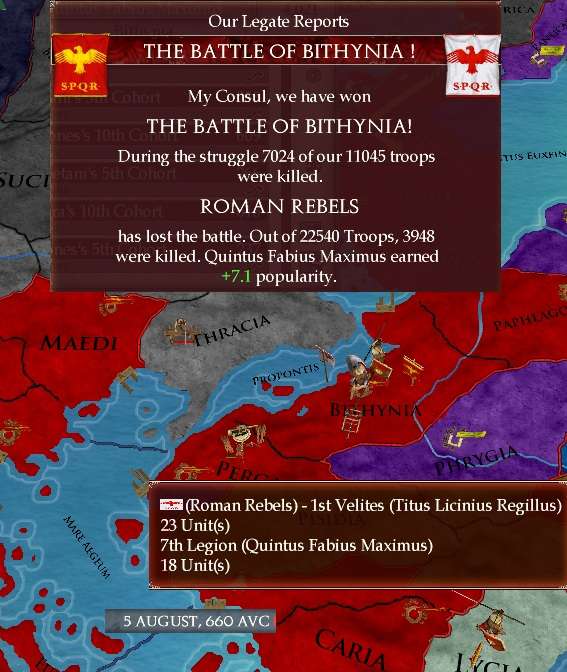
However, the threat was shortlived. Their new armies were poorly trained and fractured by internal disputes. By the end of October, the two forces they had raised in Asia Minor had been scattered.
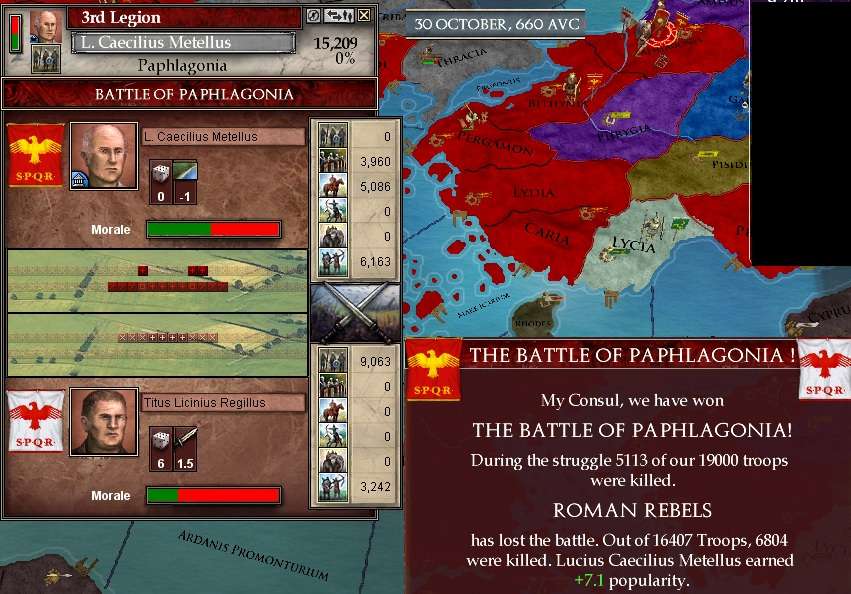
Even so, by raising the threat of Servile Revolt, the rebels had threatened the foundation of the Republic and any chance for leniency towards their leadership was lost. In any case the Senate was able to celebrate the new colony at Thrace and the return of Pax Romana to Greece and Asia Minor.
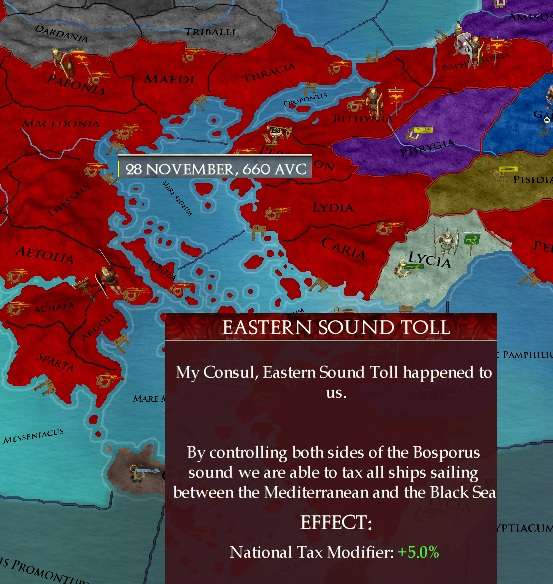
By the end of the year, the only remaining rebel stronghold was the Island of Malta, and it appeared as if the war was all but won. However, Lucius Crassus died leading his legion south to Syracuse and Gaius Julius, possibly the most inept Consul of this period, [1] came to power. The religious faction was now so dominant that it was able to impose its candidate regardless of any characteristic beyond piety.
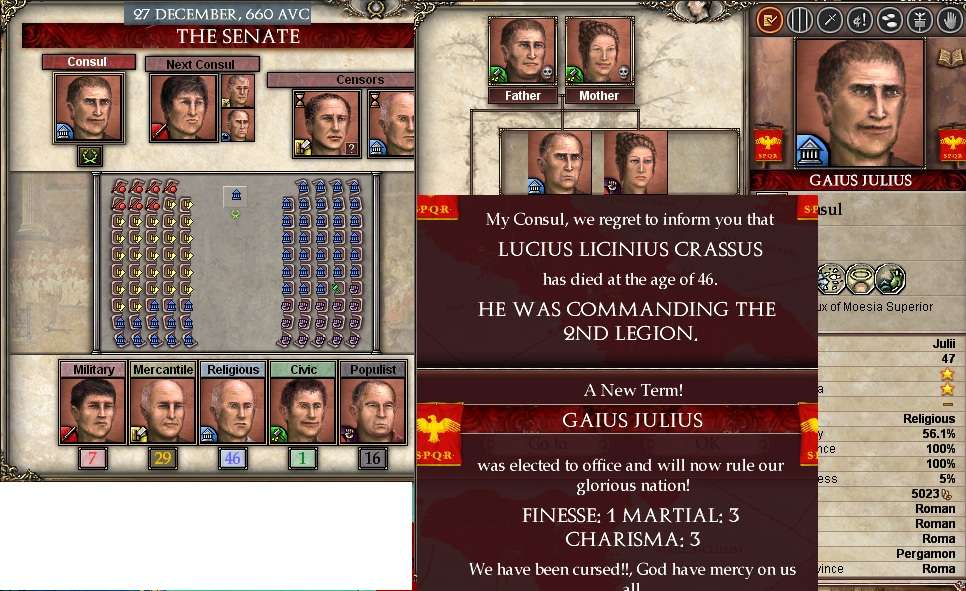
The consequences were to dominate domestic politics for the next ten years as different factional alliances formed and broke up. Over time Gaius Julius became a byword for favouritism, incompetence and corruption.
The immediate result was that the rebellion flared up again in Southern Italy.
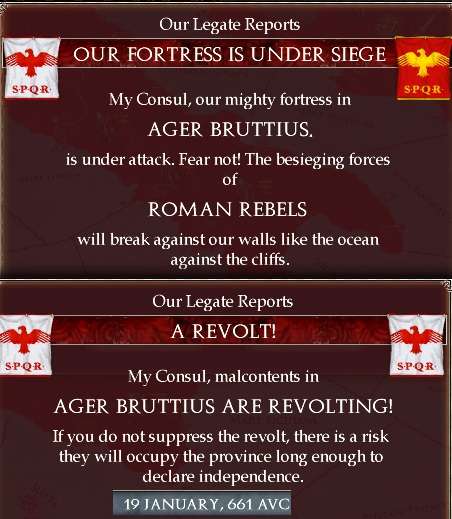
However, by spring 661, almost despite Gaius, the renewed revolt appeared to have been stamped out, with Malta the remaining city held by Catulus.
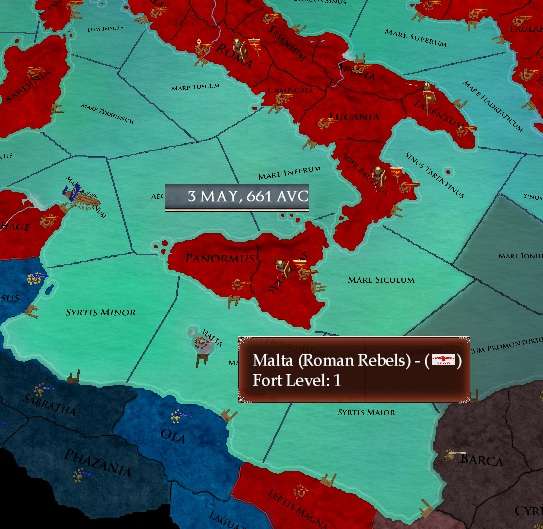
The first invasion of Malta took place despite Quintus Mucius ignoring the omens and led to a setback that almost saw the complete destruction of the 2nd Legion.
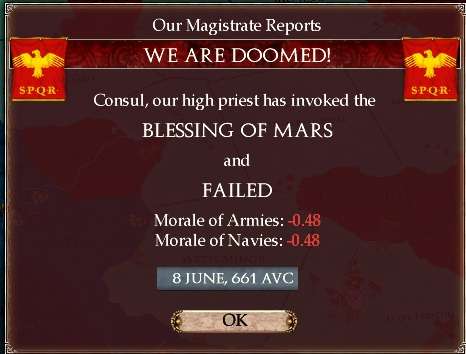
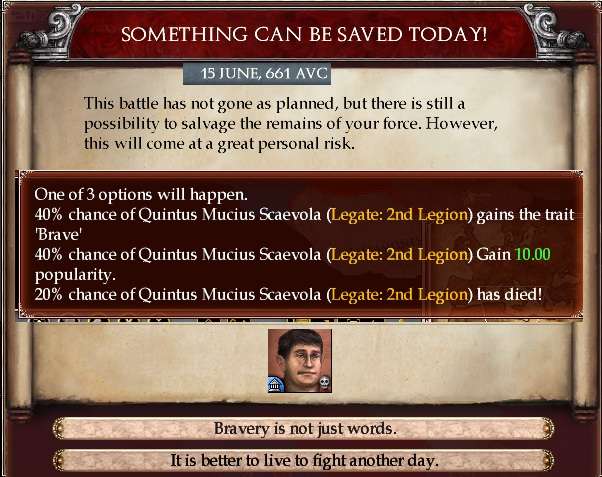
Despite this setback, by November, the fortress of Malta was under siege, and fell in January 662
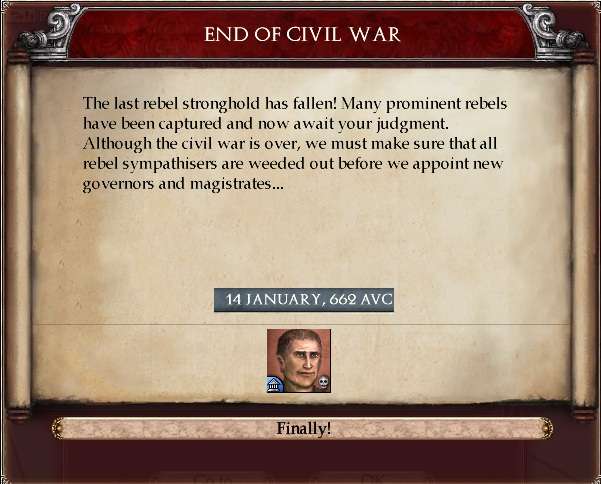
Bringing the war to an end.
Catulus was captured, alledgedly trying to escape dressed in women's clothes
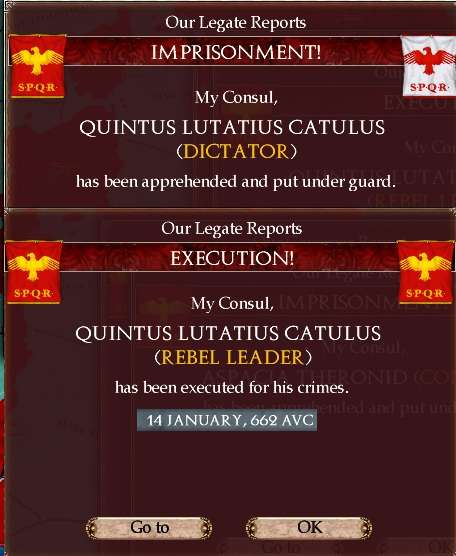
Caught at the docks by enraged legionaries, he was executed on the spot. Most of the others were arrested and sent to Rome to await trail.
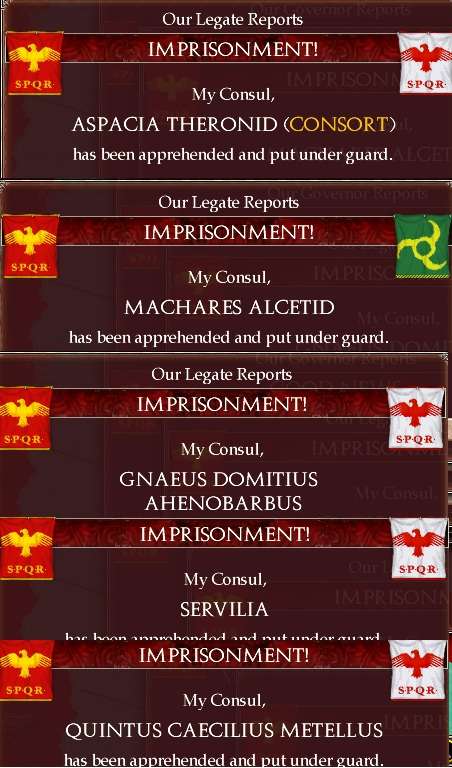
However, it was the fate of Gaius Marius, former consul, saviour of Rome, and the man responsible for the current organisation of the legions, that was to capture the imagination.
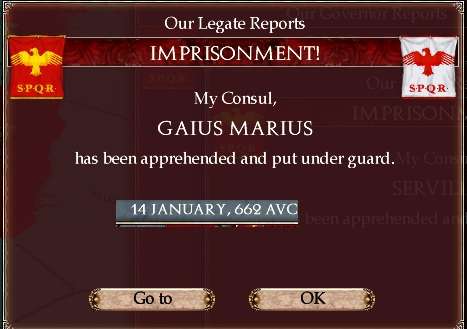
The war may have been ended, but the drama was not over.
[1] – guess who wasn't paying enough attention to the politics screen while concentrating on the war.
By the summer of 660, not only did it appear as the Civil War was over but the legions won a stunning victory on the lower Danube, securing the new colonies in Thrace

However, even as the 7th Legion moved back into Asia Minor, it became clear the revolt had taken a new form. The leadership of the rebellion had adopted a new tactic. Having lost most of their territory they commenced an attempt to challenge the Senate on the battlefield. A series of hastily raised armies comprised of provincial forces, deserters, those seeking future gains and, worst of all in the eyes of the Senate, freed slaves, sought to take the advantage back from the Senate.

However, the threat was shortlived. Their new armies were poorly trained and fractured by internal disputes. By the end of October, the two forces they had raised in Asia Minor had been scattered.

Even so, by raising the threat of Servile Revolt, the rebels had threatened the foundation of the Republic and any chance for leniency towards their leadership was lost. In any case the Senate was able to celebrate the new colony at Thrace and the return of Pax Romana to Greece and Asia Minor.

By the end of the year, the only remaining rebel stronghold was the Island of Malta, and it appeared as if the war was all but won. However, Lucius Crassus died leading his legion south to Syracuse and Gaius Julius, possibly the most inept Consul of this period, [1] came to power. The religious faction was now so dominant that it was able to impose its candidate regardless of any characteristic beyond piety.

The consequences were to dominate domestic politics for the next ten years as different factional alliances formed and broke up. Over time Gaius Julius became a byword for favouritism, incompetence and corruption.
The immediate result was that the rebellion flared up again in Southern Italy.

However, by spring 661, almost despite Gaius, the renewed revolt appeared to have been stamped out, with Malta the remaining city held by Catulus.

The first invasion of Malta took place despite Quintus Mucius ignoring the omens and led to a setback that almost saw the complete destruction of the 2nd Legion.


Despite this setback, by November, the fortress of Malta was under siege, and fell in January 662

Bringing the war to an end.
Catulus was captured, alledgedly trying to escape dressed in women's clothes

Caught at the docks by enraged legionaries, he was executed on the spot. Most of the others were arrested and sent to Rome to await trail.

However, it was the fate of Gaius Marius, former consul, saviour of Rome, and the man responsible for the current organisation of the legions, that was to capture the imagination.

The war may have been ended, but the drama was not over.
[1] – guess who wasn't paying enough attention to the politics screen while concentrating on the war.
Those armies they got are what in more peaceful times would be standard rebel scum. One of the risks of civil war when there is noticeable revolt risk (though luckily any revolts on rebel lands would join you, though getting commanders to them can be tricky).
Well, good luck, not that you need it when you have the greatest consul to ever have lived to lead the republic. Any idea what was up with that Lycian that got imprisoned (Machares Alcetid)?
Well, good luck, not that you need it when you have the greatest consul to ever have lived to lead the republic. Any idea what was up with that Lycian that got imprisoned (Machares Alcetid)?
Always exciting to find another loki100 AAR, even more exciting to find a loki100 Rome AAR!
Wow, the Civil War is over, but did you really 'win' it, considering you have a Consul who shows fewer signs of intelligent life than a bag of moldy potatoes*?
You leave us with a nice cliffhanger. I wonder what it all means - what reason could you possibly have to not immediately put Marius to death, along with all of his rebellious cronies? Are you that short on government talent (or even warm bodies), that you need to keep a bunch of traitors ready to come off the bench?
And how about your economy and, more importantly, your manpower? How long until you can resumeoffensive operations the pacification and civilization of barbarian lands, for the Greater Good of all involved?
Questions, questions, questions.
*I know the Romans didn't have potatoes. I haven't decided yet whether or not to pretend this makes my remark extra clever, or if I should just admit it's a far-fetched metaphor to begin with.
You leave us with a nice cliffhanger. I wonder what it all means - what reason could you possibly have to not immediately put Marius to death, along with all of his rebellious cronies? Are you that short on government talent (or even warm bodies), that you need to keep a bunch of traitors ready to come off the bench?
And how about your economy and, more importantly, your manpower? How long until you can resume
Questions, questions, questions.
*I know the Romans didn't have potatoes. I haven't decided yet whether or not to pretend this makes my remark extra clever, or if I should just admit it's a far-fetched metaphor to begin with.
Last edited:
An end to the war, and a new colony! The sound toll is certainly no small prize, as well.
Once (if?) your manpower recovers, I suppose you've got to find someone to knock down... I wonder what Numidia is up to. They're sitting on some more than modest holdings and are in a position from which they can threaten most of your empire, though they probably don't have access to Iron, if memory serves. Numidia delenda est!
Once (if?) your manpower recovers, I suppose you've got to find someone to knock down... I wonder what Numidia is up to. They're sitting on some more than modest holdings and are in a position from which they can threaten most of your empire, though they probably don't have access to Iron, if memory serves. Numidia delenda est!
New Consul - new meaning to the terms -dumber than a box of rocks & bag of hammers.
Been mostly just reading lately
Been mostly just reading lately
Perhaps the current consul is Gaius Julius Caesar hiding behind a fake identity without his nickname and driving the country to a chaos so he can seize it all when the time is ripe..?



